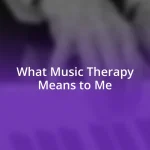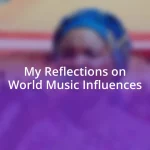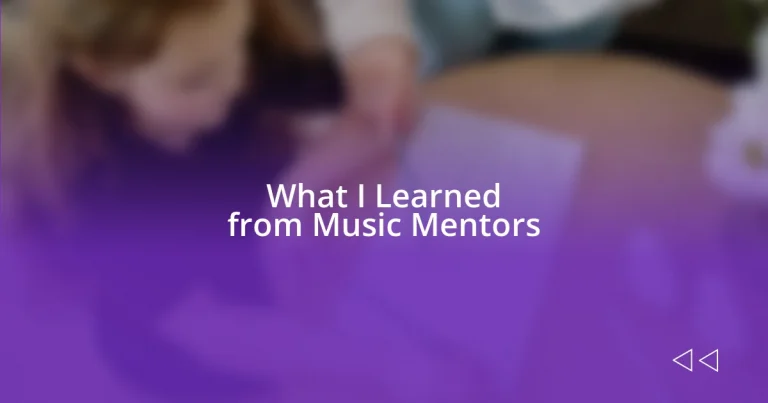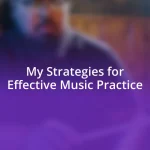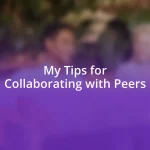Key takeaways:
- Music mentors provide essential guidance in both technical skills and personal growth, fostering self-confidence and creative exploration.
- Effective mentorship is characterized by active listening, adaptability, and genuine encouragement, creating a supportive and engaging learning environment.
- Building a lasting mentor-mentee relationship involves trust, mutual respect, and proactive involvement, enriching the learning experience and fostering friendship.
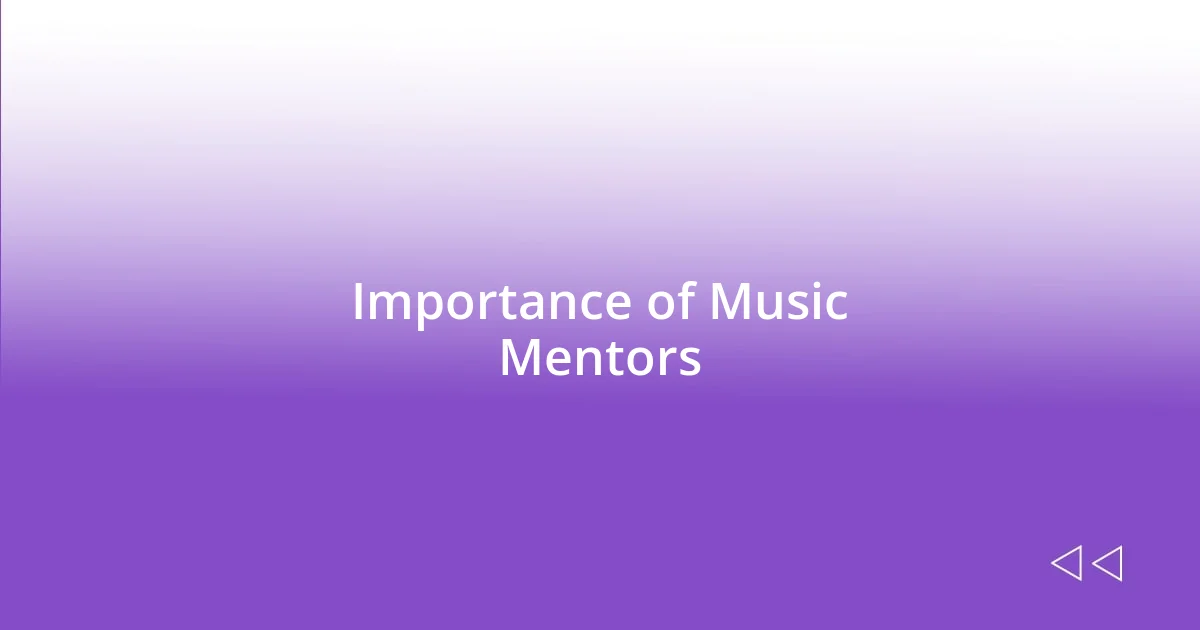
Importance of Music Mentors
Music mentors play an invaluable role in a musician’s journey, often guiding them not just in technique but in personal development. I remember my first guitar teacher, who patiently worked with me to refine my skills, always encouraging me to express my unique voice. Without that supportive push, I might have stayed stuck in my comfort zone, missing the chance to evolve both as a musician and a person.
Moreover, the emotional support that music mentors provide can be just as transformative as their technical instruction. I recall a late-night session where I felt overwhelmed by self-doubt. My mentor listened, shared his own struggles, and reminded me that every artist faces challenges. Doesn’t it help to talk to someone who understands what you’re going through? That bond can turn ordinary lessons into profound life experiences.
Additionally, music mentors often serve as role models, illustrating what dedication and passion look like in practice. Watching my mentor pour his heart into every performance inspired me to do the same. Have you ever felt that spark of motivation from someone who believes in you? It’s that kind of influence that reinforces the importance of mentorship in any artistic field, making the learning process richer and more fulfilling.
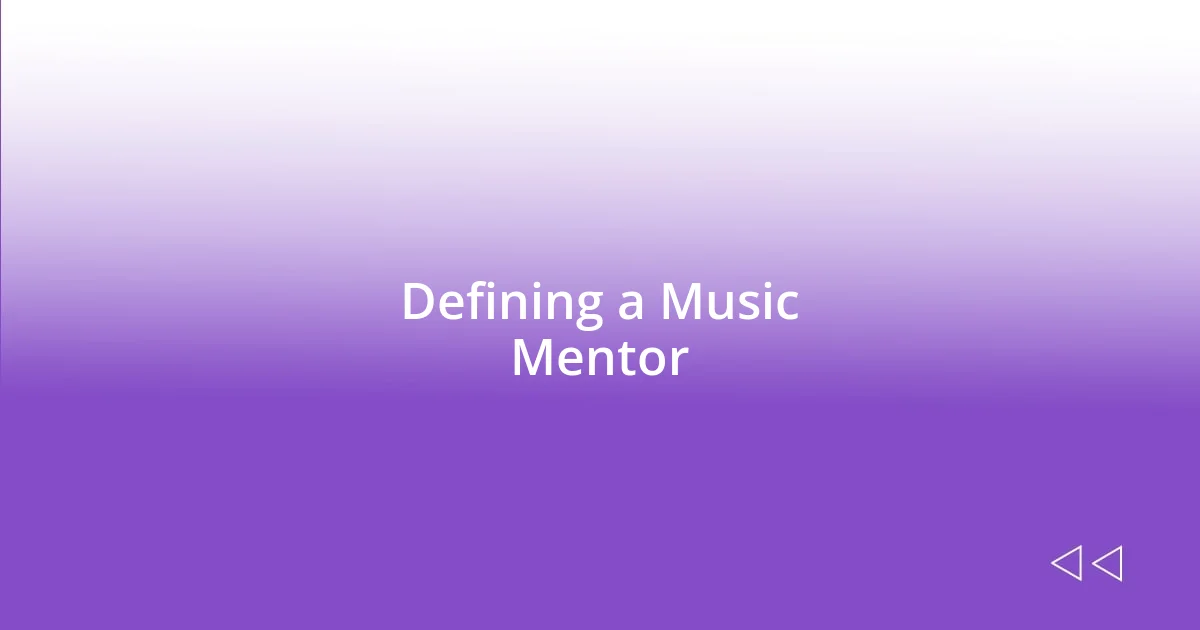
Defining a Music Mentor
Defining a music mentor can be a nuanced task. To me, a music mentor is not just an instructor; they are a trusted ally in your artistic journey. I often think back to my vocal coach who introduced me to improvisation. It wasn’t just about hitting the right notes—it was about being brave enough to explore sound and emotion.
Furthermore, music mentors embody a specific balance between teaching skill and nurturing creativity. In my experience, my piano teacher didn’t just correct my finger placements; she encouraged me to transform classical pieces into my own interpretations. This dual focus has often helped me appreciate the depth in music beyond just technicality.
Lastly, a music mentor often becomes a lifelong facilitator of growth. I can recall moments when I didn’t believe in my potential, and it was my mentor’s unwavering belief that sparked my journey toward self-confidence. To me, this relationship is foundational, intertwining learning with personal evolution.
| Characteristics | Description |
|---|---|
| Instructor | Teaches skills and techniques for mastery |
| Ally | Provides emotional support and encouragement |
| Role Model | Exemplifies dedication and passion for art |
| Facilitator | Encourages personal and creative growth |
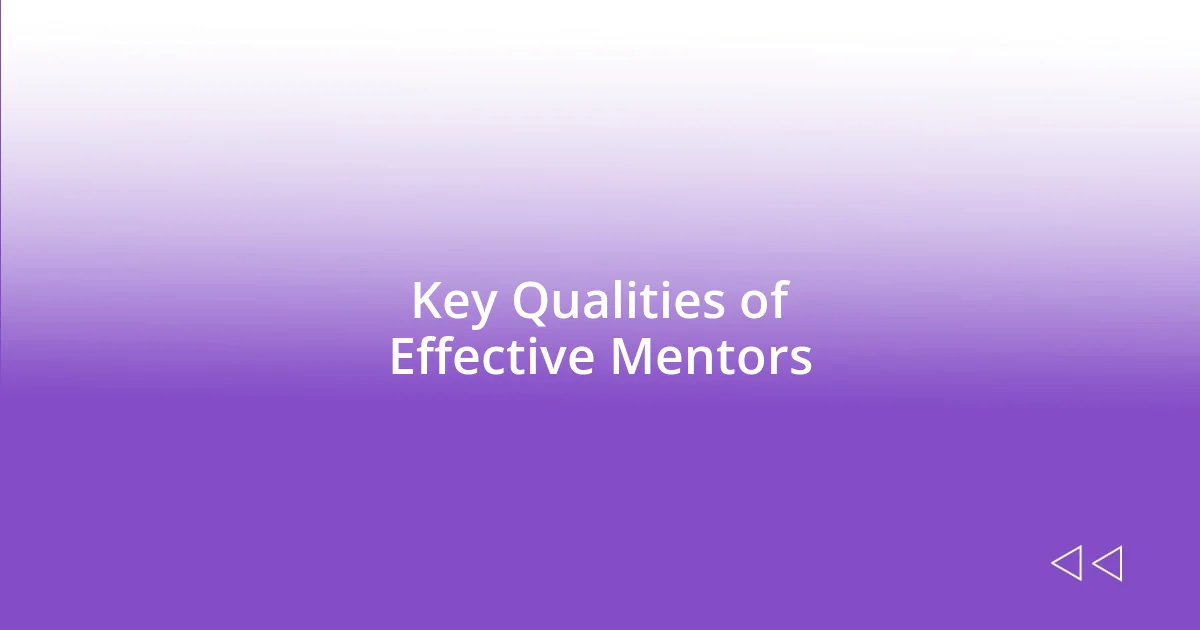
Key Qualities of Effective Mentors
One of the standout qualities that make an effective mentor in music is their ability to listen actively. In my experience, becoming vulnerable with my mentors often led to breakthroughs in both my music and my personal life. I remember sitting with my woodwinds teacher, who had a knack for noticing the nuances in my playing that I had overlooked. He would pause and ask, “What do you feel when you play this part?” It’s that kind of engaging dialogue that transforms a lesson into a discovery process.
Additionally, effective mentors show adaptability. They tailor their approach based not only on their expertise but also on your individual needs. I vividly recall a time when my drum instructor switched up his teaching methods after realizing I struggled with traditional timing exercises. Instead, he used rhythm games that turned practice into fun. This adaptability makes learning not just impactful but also enjoyable.
- Active Listening: They encourage open dialogue, prompting deeper reflection on one’s art.
- Adaptability: They adjust their methods to suit the unique needs and styles of each student.
- Encouragement: They genuinely celebrate small victories, making the journey enjoyable.
- Empathy: They share personal journeys, helping students feel less alone in their struggles.
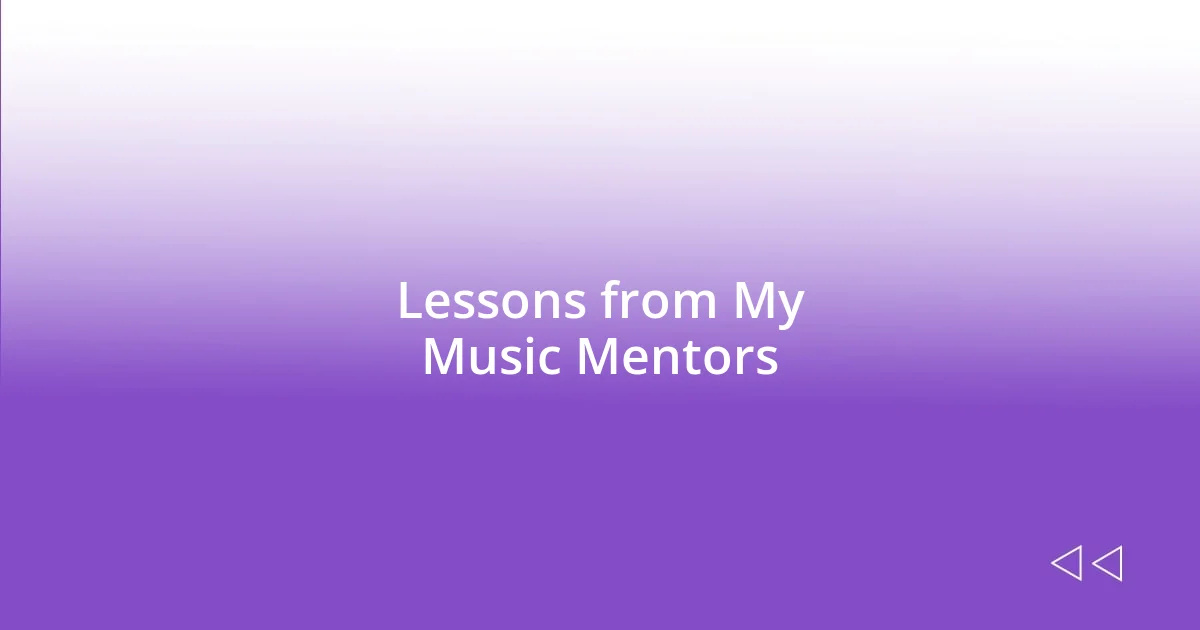
Lessons from My Music Mentors
One vital lesson I’ve learned from my music mentors is the importance of embracing failure as part of the journey. I remember a particularly challenging piece that I stumbled over repeatedly. Instead of giving up, my guitar mentor encouraged me to view each mistake as an opportunity to deepen my understanding. He would often say, “Every great musician has faced setbacks; it’s how you grow from them that counts.” This mindset not only transformed my approach to practice but also made me more resilient in other areas of my life.
Another key insight I gained was the significance of genuine passion. I had a singing coach who never failed to express her love for the art. During our sessions, she’d often share her stories of performances, filled with both joy and adversity. Her enthusiasm was infectious, reminding me that music isn’t just about technique; it’s about connecting with the audience and conveying emotion. I found myself asking, “What does my music say about me?” This question sparked a deeper connection with my craft.
Finally, mentorship has reinforced the value of collaboration. Working alongside my peers under my mentor’s guidance taught me that music can be a communal experience. I recall one group project where we created original arrangements together; my mentor facilitated our jam sessions, encouraging us to build off each other’s ideas. It was exhilarating to see our individual contributions blend into something unique. This experience not only improved my musicianship but also highlighted the beauty of shared creativity in the music world.
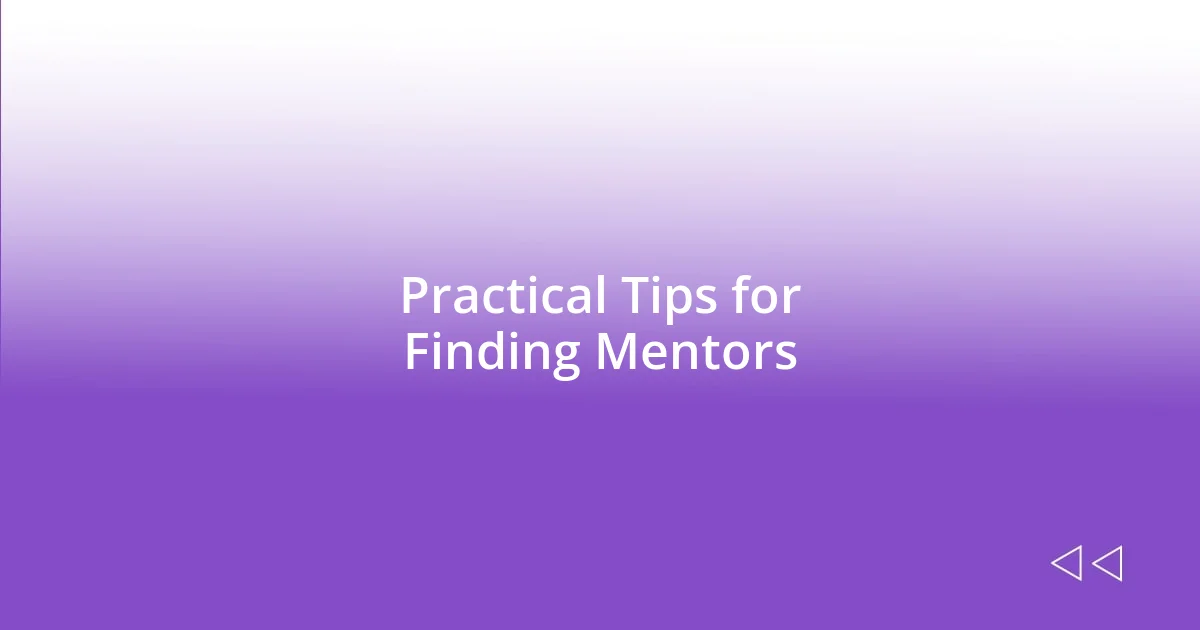
Practical Tips for Finding Mentors
Finding the right mentor can feel daunting, but it doesn’t have to be. Start by tapping into your existing network. Think about teachers, local musicians, or even friends who are further along in their musical journey. I remember reaching out to a friend who was well-known in the local scene. I was surprised at how willing he was to share his experiences and even invite me to his rehearsals. Sometimes, all you need to do is ask.
Another impactful strategy is to attend music workshops or community events. Being in environments where you’re surrounded by like-minded individuals not only expands your network but also puts you in proximity to potential mentors. I recall attending a weekend retreat where I met several seasoned musicians. One became a mentor simply by sharing insights during a songwriting session, and it sparked a valuable relationship that lasted for years. It’s amazing how the right setting can bring you closer to those who can guide you.
Lastly, don’t overlook the power of online platforms. Today, social media and music forums offer vast opportunities to connect with experienced musicians worldwide. I once joined an online group where professionals were eager to offer their wisdom. One particular mentor stood out; his informative posts and willingness to engage in discussions not only taught me a lot but also made me feel part of a larger community. This digital connection proved that mentorship can transcend geographical boundaries, creating endless possibilities for growth.
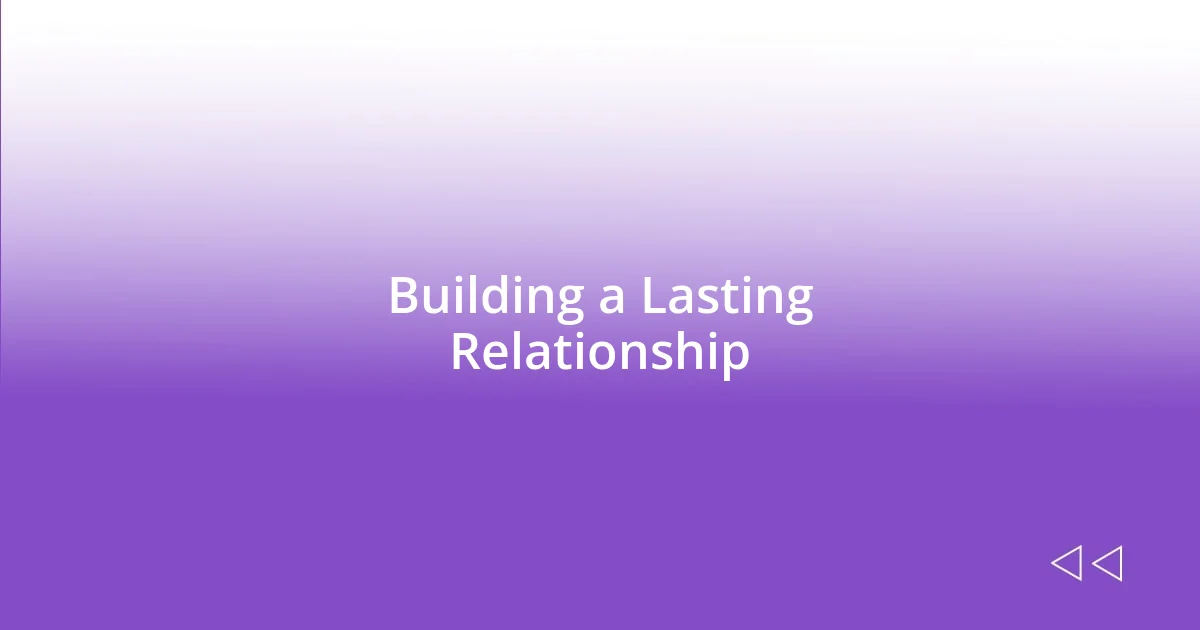
Building a Lasting Relationship
Building a lasting relationship with a mentor in music is about more than just learning techniques; it’s about nurturing a bond based on mutual respect and understanding. I remember attending one of my mentor’s performances and feeling that spark of connection amplify. As I watched him engage with the audience, I realized how much I admired his authenticity. It made me think, “What makes a mentor more than just a teacher?” I’ve found that it’s the willingness to be vulnerable and share experiences that truly strengthens that relationship.
Trust is a cornerstone of any mentor-mentee dynamic. There was a moment during a particularly rough rehearsal when I messed up a critical part. Instead of chastising me, my mentor took a step back and shared his own experiences of failure. That openness not only eased my anxiety but also reinforced the safety in our relationship. It’s moments like this that make me reflect on how vital it is for both parties to feel comfortable sharing their journeys, struggles, and victories.
As time passed, I began to see mentorship as a two-way street. I would often bring my own ideas and compositions to our sessions, eager to get his feedback. This exchange cultivated not just respect but a sense of partnership. I often asked myself if I was contributing meaningfully to our discussions. The more involved I became, the more engaged he seemed, which built a camaraderie that enriched my learning experience. This reciprocity not only shaped my skills but also laid the groundwork for a lasting bond, turning our relationship into more than just a mentor-mentee connection—it became a friendship based on shared passion and growth.
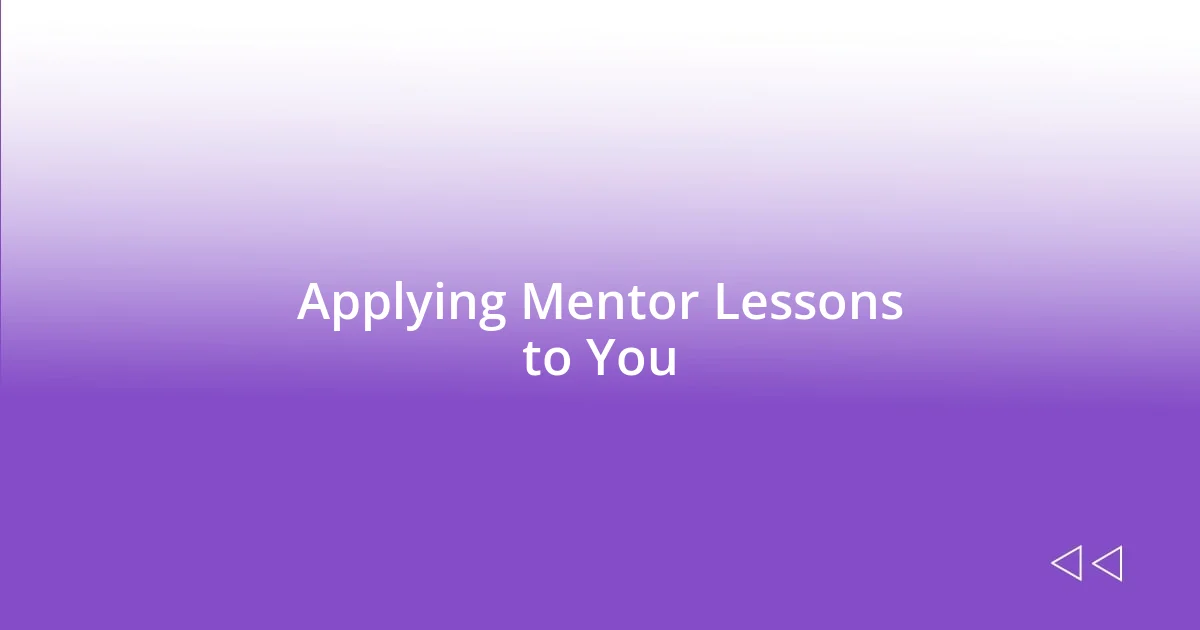
Applying Mentor Lessons to You
Reflecting on the lessons I learned from my mentors, I’ve discovered that applying their insights requires intentionality. For instance, when my guitar teacher shared techniques for improvisation, I didn’t just practice them in isolation; I made it a point to integrate those lessons in my jam sessions with friends. How often do we let great advice slip away without action? I realized that taking bold steps to implement their teachings in real-life scenarios was key to my growth.
One lesson that stands out is the importance of active listening. During one memorable conversation with my vocal coach, she emphasized that to truly connect with an audience, we must first understand the emotion behind the music. It made me think—Are we genuinely paying attention to what we’re expressing through our art? I took this to heart, which led me to engage more deeply with my songwriting. Every note now carries a story I’m eager to share, and I find that when I listen to others, I’m more inspired in return.
Moreover, mentorship taught me the value of consistency. When my drum mentor encouraged me to practice daily, I initially resisted. However, after committing to a structured routine, I noticed a world of improvement. It’s funny how small, consistent efforts can yield significant results, isn’t it? I now ask myself, “What can I do daily to honor the lessons imparted to me?” This question drives my practice and keeps me focused on continual progress, reflecting the strength of my mentors’ teachings in every beat I play.


